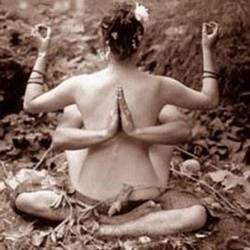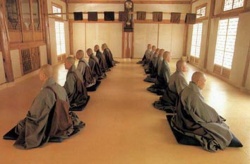Difference between revisions of "Distinguishing The Direct Methods"
| (2 intermediate revisions by the same user not shown) | |||
| Line 4: | Line 4: | ||
| − | The [[objective]] phenomenologically is to {{Wiki|present}} teachings that support contemplation, that in turn support a correct and natural [[life]] free from the [[mental]] chains and inhibitions of [[Samsara]]. | + | The [[objective]] [[phenomenologically]] is to {{Wiki|present}} teachings that support contemplation, that in turn support a correct and natural [[life]] free from the [[mental]] chains and inhibitions of [[Samsara]]. |
Teachings presented here are those of the old [[masters]] devoid of the [[rites]], {{Wiki|ceremonies}}, {{Wiki|legends}} and {{Wiki|superstitions}} that have stagnated {{Wiki|modern}} [[buddhism]]. | Teachings presented here are those of the old [[masters]] devoid of the [[rites]], {{Wiki|ceremonies}}, {{Wiki|legends}} and {{Wiki|superstitions}} that have stagnated {{Wiki|modern}} [[buddhism]]. | ||
| Line 14: | Line 14: | ||
We are [[fortunate]] that [[Dharma]], in and of itself, is constantly in [[evolution]] and we are equally [[fortunate]] that the solutions which lead to [[human]] freedom have also evolved in the [[east]], although their [[truth]] has been sadly masked by folly of {{Wiki|sectarian}} [[clinging]]. | We are [[fortunate]] that [[Dharma]], in and of itself, is constantly in [[evolution]] and we are equally [[fortunate]] that the solutions which lead to [[human]] freedom have also evolved in the [[east]], although their [[truth]] has been sadly masked by folly of {{Wiki|sectarian}} [[clinging]]. | ||
| − | When the [[dharma]] reached [[China]] contemplation and accompanying [[understanding]] moved forward generating contemplations with different [[form]] and access points, all of which are valid, but do not all reach the same levels of [[higher consciousness]]. | + | When the [[dharma]] reached [[China]] contemplation and accompanying [[understanding]] moved forward generating [[contemplations]] with different [[form]] and access points, all of which are valid, but do not all reach the same levels of [[higher consciousness]]. |
| − | We teach all these methods and therefore can reach all those who have the [[calmness]], [[patience]], resolution, perseverance, capacity to introspect and the willingness to [[Wikipedia:sacrifice|sacrifice]] the products of their [[clinging]] to [[Samsara's]] folly. | + | We teach all these [[methods]] and therefore can reach all those who have the [[calmness]], [[patience]], resolution, perseverance, capacity to introspect and the willingness to [[Wikipedia:sacrifice|sacrifice]] the products of their [[clinging]] to [[Samsara's]] folly. |
| − | We therefore begin by examining the {{Wiki|contemplative}} methods from the Lankavitara [[Bodhidharma]] contemplations of "the [[Nature of Buddha]]", which are {{Wiki|distinct}} from the contemplations of the "[[Buddha Nature]]", | + | We therefore begin by examining the {{Wiki|contemplative}} [[methods]] from the [[Lankavitara]] [[Bodhidharma]] [[contemplations]] of "the [[Nature of Buddha]]", which are {{Wiki|distinct}} from the [[contemplations]] of the "[[Buddha Nature]]", |
| − | and continue up to the most elevated contemplations yet encountered, the direct access to the {{Wiki|feminine}} [[principle]] of [[Huineng's]] method of the exquisite Direct contemplation-no contemplation. | + | and continue up to the most elevated [[contemplations]] yet encountered, the direct access to the {{Wiki|feminine}} [[principle]] of [[Huineng's]] method of the exquisite Direct contemplation-no contemplation. |
| − | Rather useless arguments about Direct methods of contemplation have divided [[Chan]] and [[Zen]] historically. We consider that the only {{Wiki|salvation}} for the natural survival of the [[human]] creature in an ever complicated [[world]] is to make the options clear without {{Wiki|sectarian}} influence, but this means [[understanding]] how to perform the contemplations | + | Rather useless arguments about Direct [[methods]] of contemplation have divided [[Chan]] and [[Zen]] historically. We consider that the only {{Wiki|salvation}} for the natural survival of the [[human]] creature in an ever complicated [[world]] is to make the options clear without {{Wiki|sectarian}} influence, but this means [[understanding]] how to perform the [[contemplations]] |
| Line 30: | Line 30: | ||
We therefore point make an important step by investigating the teachings and contemplation models of the most important [[Masters]] in [[Chan]] history that have survived the censorship of [[lineage]] inventors. | We therefore point make an important step by investigating the teachings and contemplation models of the most important [[Masters]] in [[Chan]] history that have survived the censorship of [[lineage]] inventors. | ||
| − | The [[object]] of the study is to fully understand the methods, making them available to all [[sentient]] [[human]] creatures that find the [[path]] to the Gate, stripping off the [[recognized]] errors of [[orthodox]] folly. | + | The [[object]] of the study is to fully understand the [[methods]], making them available to all [[sentient]] [[human]] creatures that find the [[path]] to the Gate, stripping off the [[recognized]] errors of [[orthodox]] folly. |
{{R}} | {{R}} | ||
https://sites.google.com/site/blinddharmainsamsara/home/useful-and-important-english-teachings | https://sites.google.com/site/blinddharmainsamsara/home/useful-and-important-english-teachings | ||
| − | [[Category:]] | + | [[Category:Chan]] |
Latest revision as of 12:42, 26 December 2023
The objective phenomenologically is to present teachings that support contemplation, that in turn support a correct and natural life free from the mental chains and inhibitions of Samsara.
Teachings presented here are those of the old masters devoid of the rites, ceremonies, legends and superstitions that have stagnated modern buddhism.
When one really understands the Dharma the folly of binding oneself to a single idea is seen to be fruitless and buddha himself, teaching natural and correct expedient means, was aware of the limitations of human creatures with respect to a favourable birth, education, culture and natural capacity.
We are fortunate that Dharma, in and of itself, is constantly in evolution and we are equally fortunate that the solutions which lead to human freedom have also evolved in the east, although their truth has been sadly masked by folly of sectarian clinging.
When the dharma reached China contemplation and accompanying understanding moved forward generating contemplations with different form and access points, all of which are valid, but do not all reach the same levels of higher consciousness.
We teach all these methods and therefore can reach all those who have the calmness, patience, resolution, perseverance, capacity to introspect and the willingness to sacrifice the products of their clinging to Samsara's folly.
We therefore begin by examining the contemplative methods from the Lankavitara Bodhidharma contemplations of "the Nature of Buddha", which are distinct from the contemplations of the "Buddha Nature",
and continue up to the most elevated contemplations yet encountered, the direct access to the feminine principle of Huineng's method of the exquisite Direct contemplation-no contemplation.
Rather useless arguments about Direct methods of contemplation have divided Chan and Zen historically. We consider that the only salvation for the natural survival of the human creature in an ever complicated world is to make the options clear without sectarian influence, but this means understanding how to perform the contemplations
We therefore point make an important step by investigating the teachings and contemplation models of the most important Masters in Chan history that have survived the censorship of lineage inventors.
The object of the study is to fully understand the methods, making them available to all sentient human creatures that find the path to the Gate, stripping off the recognized errors of orthodox folly.
Source
https://sites.google.com/site/blinddharmainsamsara/home/useful-and-important-english-teachings

